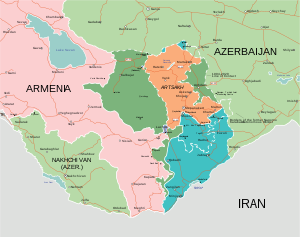2023 Nagorno-Karabakh clashes - September 21, 2023 - Recent Audio Posts – Saved Web Pages
| A request that this article title be changed is under discussion. Please do not move this article until the discussion is closed. |
| This article documents a current event. Information may change rapidly as the event progresses, and initial news reports may be unreliable. The latest updates to this article may not reflect the most current information. Feel free to improve this article or discuss changes on the talk page, but please note that updates without valid and reliable references will be removed. (September 2023) (Learn how and when to remove this template message) |
 2023 Nagorno-Karabakh clashesPart of the Nagorno-Karabakh conflict
2023 Nagorno-Karabakh clashesPart of the Nagorno-Karabakh conflictMilitary situation in Nagorno-Karabakh in 2020
| Date | 19–20 September 2023 (2023-09-19 – 2023-09-20) |
|---|---|
| Location | Nagorno-Karabakh |
| Result | Azerbaijani victory
|
| Territorial changes | Per Azerbaijan: 90 combat positions captured by Azerbaijan[3] |
Per Artsakh:[4]
- 190+ servicemen killed
- 360+ servicemen wounded
Per Azerbaijan:[5][6]
1 Azerbaijani civilian killed
1 Azerbaijani civilian injured
10 Armenian civilians killed
40 Armenian civilians injured
Between 19 and 20 September 2023, Azerbaijan initiated a military offensive against the self-declared breakaway state of Artsakh. The offensive took place in the disputed region of Nagorno-Karabakh, which is internationally recognized as a part of Azerbaijan, but populated by Armenians.[7][8] The attacks occurred in the midst of an escalating crisis caused by Azerbaijan blockading the Republic of Artsakh, which has resulted in significant scarcities of essential supplies such as food, medicine, and other goods in the affected region.[9]
One day after the offensive started, on 20 September, an agreement on establishing a complete cessation of hostilities in Nagorno-Karabakh was reached at the mediation of the Russian peacekeeping command in Nagorno-Karabakh, the Nagorno-Karabakh Presidential Office said.[10] Azerbaijan said that a meeting will be held with representatives of Artsakh on 21 September in Yevlakh.[11][12]
Background
The Nagorno-Karabakh conflict is an ethnic and territorial conflict between Armenia and Azerbaijan over the region of Nagorno-Karabakh, which is inhabited mostly by ethnic Armenians. The Nagorno-Karabakh region is entirely claimed by and partially de facto controlled by the breakaway Republic of Artsakh but is recognized internationally as part of Azerbaijan. Azerbaijan de facto controls one-third of Nagorno-Karabakh region as well as the seven surrounding districts.
The conflict escalated in 1988, when the Karabakh Armenians demanded the transfer of the region from Soviet Azerbaijan to Soviet Armenia, triggering the First Nagorno-Karabakh War. In late 2020, the large-scale Second Nagorno-Karabakh War resulted in thousands of casualties and a significant Azerbaijani victory. An armistice was established by a tripartite ceasefire agreement on 10 November, resulting in Armenia and Artsakh losing the territories surrounding Nagorno-Karabakh as well as one-third of Nagorno-Karabakh itself.[13] Ceasefire violations in Nagorno-Karabakh and on the Armenian-Azerbaijani border have continued following the 2020 war, with intermittent but ongoing casualties.
Since the 2020 war, Azerbaijan has rescinded its offer of special status or autonomy to its indigenous Armenian residents and instead insists on their "integration" into Azerbaijan.[14][15] International mediators and human rights organizations have emphasized self-determination for the local Armenian population[16][17] and do not believe that Artsakh Armenians can live safely under the dynastic, authoritarian regime[18][19] of Azerbaijani President Ilham Aliyev.[20][21]


Comments
Post a Comment